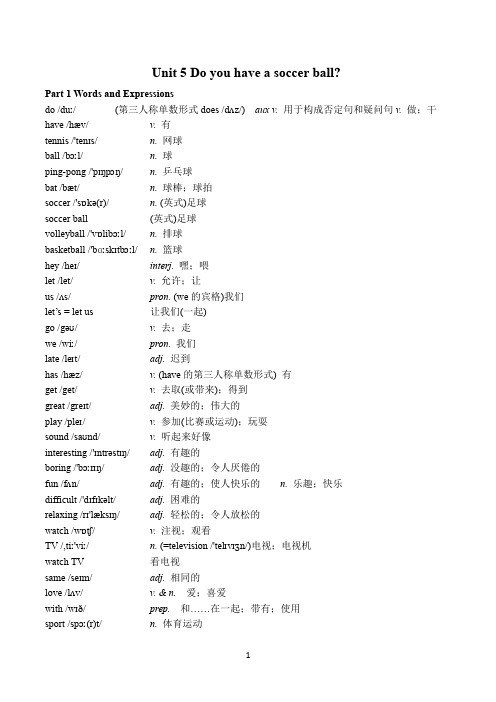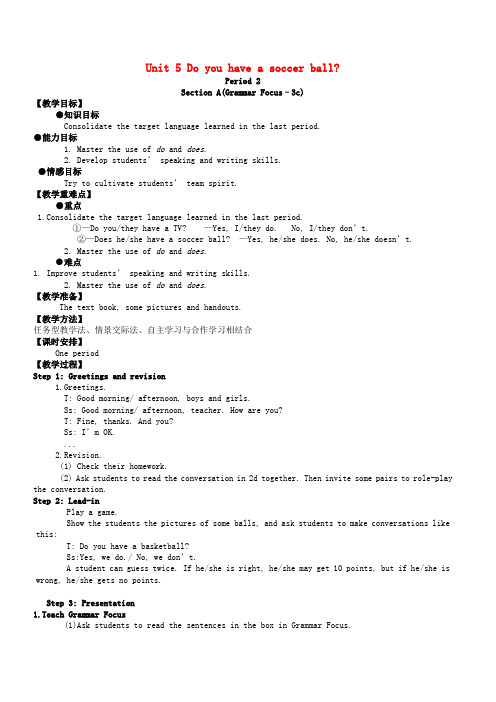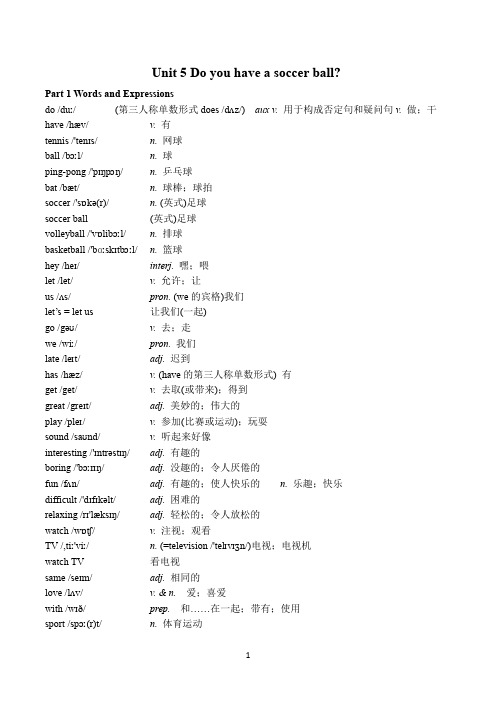精品2019七年级英语上册 Unit 5 Do you have a soccer ball(第4课时)(3a-4)导学案人教新目标版
【小初高学习]2018-2019学年七年级英语上册 Unit 5 Do you have a soc
![【小初高学习]2018-2019学年七年级英语上册 Unit 5 Do you have a soc](https://img.taocdn.com/s3/m/56535cd3aeaad1f346933fb8.png)
Unit 5 Do you have a soccer ballSection B(1a-1d)知能演练提升Ⅰ.根据句意及汉语提示完成单词1.I like playing soccer;it’s very (有趣的).2.I don’t like watching TV;it’s (无聊的).3.I think English is very (困难的) to learn (学) well.4.Swimming is very (使人快乐的).I like it.5.Listening to music is (轻松的).Ⅱ.选词填空1.Are you in this computer game?2. go to the school library this afternoon.3.What about TV this evening?4.He doesn’t like this book.It’s .5.—Let’s play basketball.—That good.Ⅲ.单项选择1.—Let’s play baseball.—Oh,no,that sounds .A.boringB.goodC.interestingD.relaxing2.We every day.A.watch a TVB.watches TVC.watch TVD.watches a TV3.I have an book.A.goodB.funC.boringD.interesting4. you computer games?A.Do;playsB.Do;playC.Are;playD.Are;plays5.Here is basketball.Do you play basketball?A.a;theB.a;aC.a;/D.the;theⅣ.根据图片及括号内提示完成句子1..(Paul,plays,in,morning)2..(Lily,play,well)3..(Helen,not,have)4.?(does,your brother,play,every day) 5..(let’s,play)参考答案Ⅰ.1.interesting 2.boring 3.difficult 4.fun5.relaxingⅡ.1.interested 2.Let’s3.watching 4.boring5.soundsⅢ.1.A 2.C 3.D 4.B 5.CⅣ.1.Paul plays ping-pong in the morning2.Lily plays tennis well3.Helen doesn’t have a basketball4.Does your brother play soccer every day5.Let’s play tennis。
Unit 5 Do you have a soccer ball 七年级上课文原文及重点

Unit 5 Do you have a soccer ball?Part 1 Words and Expressionsdo /duː/ (第三人称单数形式does /dʌz/) aux v.用于构成否定句和疑问句v.做;干have /hæv/ v.有tennis /'tenɪs/ n. 网球ball /bɔːl/ n.球ping-pong /'pɪŋpɔŋ/ n. 乒乓球bat /bæt/ n. 球棒;球拍soccer /'sɒkə(r)/ n. (英式)足球soccer ball (英式)足球volleyball /'vɒlibɔːl/ n.排球basketball /'bɑːskɪtbɔːl/ n.篮球hey /heɪ/ interj.嘿;喂let /let/ v. 允许;让us /ʌs/ pron. (we的宾格)我们let’s = let us 让我们(一起)go /gəʊ/ v.去;走we /wiː/ pron.我们late /leɪt/ adj. 迟到has /hæz/ v. (have的第三人称单数形式) 有get /get/ v.去取(或带来);得到great /greɪt/ adj.美妙的;伟大的play /pleɪ/ v. 参加(比赛或运动);玩耍sound /saʊnd/ v.听起来好像interesting /'ɪntrəstɪŋ/ adj.有趣的boring /'bɔːrɪŋ/adj.没趣的;令人厌倦的fun /fʌn/ adj.有趣的;使人快乐的n.乐趣;快乐difficult /'dɪfɪkəlt/ adj. 困难的relaxing /rɪ'læksɪŋ/ adj.轻松的;令人放松的watch /wɒtʃ/ v.注视;观看TV /,tiː'viː/ n. (=television /'telɪvɪʒn/)电视;电视机watch TV看电视same /seɪm/ adj. 相同的love /lʌv/ v. & n. 爱;喜爱with /wɪð/ prep.和……在一起;带有;使用sport /spɔː(r)t/ n. 体育运动them /ðəm/ pron. (they的宾格) 他(她、它)们only /'əʊnli/ adv.只;仅like /laɪk/ v. 喜欢;喜爱easy /'iːzi/ adj.容易的;不费力的after /'ɑːftə(r)/prep. & conj.在……之后class /klɑːs/ n.班级;课classmate /'klɑːsmeɪt/ n.同班同学Bill /bɪl/比尔(男名)Part 2:Texts课文(一)Cindy:Hey, Helen, let’s go! We’re late!Helen: OK.Cindy: Do you have the baseball?Helen: Yes, I do. It’s in my bag.Cindy: And where’s our baseball bat?Helen: Bill has it.Cindy: Oh, yeah. And do you have your jacket?Helen: Oh, no, I don’t. It’s on the chair. Let me get it. Cindy: And your hat, too!Helen: OK, I have my jacket and hat. Let’s go!Structure1. Do you have a baseball?Yes, I do./No, I don’t. I have a volleyball.2. Do you have a ping-pong bat?Yes, I do./No, I don’t. I have a ping-pong ball.3. Does she have a tennis ball?Yes, she does./No, she doesn’t. She has a baseball.4. Does he have a soccer ball?Yes, he does./No. he doesn’t. He has two ping-pong bats. 5. Do they have a basketball?句型:—Do/Does sb. have…?—Yes, sb. do / does.—No, sb. don’t / doesn’t.Write each word in the correct place in the chart.将方框中的单词填入表格中正确的位置。
人教版英语七年级上册Unit-5--do-you-have-a-soccer-ball

人教版英语七年级上册Unit 5 Do you have a soccer ball?单元教材分析本单元主要学习动词have的一般现在时的用法;使用do和does引导的一般疑问句的构成以及简单回答。
本单元围绕“和朋友一起欢度时光”这一话题安排了三个任务:一是列举所学的运动项目,从中挑选出各自喜欢的体育项目,并说明原因,目的是巩固并新学一些体育项目的名词;二是让学生互相询问所爱好的运动,并根据情况发出邀请,学会用have对物品的所属进行提问与回答,掌握用do和does引导的一般疑问句的构成及使用,了解用Let’s 提建议的句型;三是写作,把任务一、二的完成情况写成日记,进一步复习、巩固所学的语言目标。
通过本单元的学习,学会用have对物品的所属进行提问与回答;学会用let’s…句型提建议;能够谈论自己喜欢哪些球类运动,不喜欢哪些球类运动及原因;能够谈论怎样和自己的朋友度过一段愉快的时光。
单元总体目标.1. 在询问对方是否有某物的对话中学会使用do和does引导的一般疑问句。
2. 学会使用描述性的形容词来评价事物。
3. 学会在对话中使用名词复数。
4. 学会用祈使句来向对方提出建议。
5. 学会用祈使句询问某人是否有某物。
6. 学会向他人提出建议的句子。
7. 学习了解一般现在时。
8. 在本单元中,通过阅读有关运动的文章和对话,使学生更加热爱体育活动并培养一种适合自己的体育爱好。
9.在小组活动中,培养学生团结协作精神。
单元重难点一览表本单元的主题是使用have对物品的所属进行提问及回答,以掌握行为动词在一般现在时中的构成和使用;同时引导学生使用所学的句型谈论自己在球类运动中的喜好。
行为动词在一般现在时的肯定句、否定句和一般疑问句中的构成和使用是初中英语教学中非常重要的内容,本单元知识的掌握程度将直接影响今后的英语学习。
学生在以前的学习中已经掌握了be动词在一般现在时中的构成和使用,在学生的头脑中也已经形成了一个模式,这种模式将直接影响学生对本单元知识内容的接受,所以教师在教学中一定要善于引导,以免学生养成不良习惯。
2019秋七年级英语上册 Unit 5 Do you have a soccer ball Se

Unit 5 Do you have a soccer ball?Period 2Section A(Grammar Focus–3c)【教学目标】●知识目标Consolidate the target language learned in the last period.●能力目标1. Master the use of do and does.2. Develop students’ speaking and writing skil ls.●情感目标Try to cultivate students’ team spirit.【教学重难点】●重点1.Consolidate the target language learned in the last period.①—Do you/they have a TV? —Yes, I/they do. No, I/they don’t.②—Does he/she have a soccer ball? —Yes, he/she does. No, he/she doesn’t.2. Master the use of do and does.●难点1. Improve students’ speaking and writing skills.2. Master the use of do and does.【教学准备】The text book, some pictures and handouts.【教学方法】任务型教学法、情景交际法、自主学习与合作学习相结合【课时安排】One period【教学过程】Step 1: Greetings and revision1.Greetings.T: Good morning/ afternoon, boys and girls.Ss: Good morning/ afternoon, teacher. How are you?T: Fine, thanks. And you?Ss: I’m OK....2.Revision.(1) Check their homework.(2) Ask students to read the conversation in 2d together. Then invite some pairs to role-play the conversation.Step 2: Lead-inPlay a game.Show the students the pictures of some balls, and ask students to make conversations like this:T: Do you have a basketball?Ss:Yes, we do./ No, we don’t.A student can guess twice. If he/she is right, he/she may get 10 points, but if he/she is wrong, he/she gets no points.Step 3: Presentation1.Teach Grammar Focus(1)Ask students to read the sentences in the box in Grammar Focus.(2)Explain the grammar points to the students.(3)Ask students to make conversations in turn like this:S1: Do you have a baseball?S2:Yes,..../No,...S1: Do you have a ping-pong bat?S2:Yes,..../No,...S1: Does she have a tennis ball?S2:Yes,..../No,...(5) Leave students several minutes to do this work.(6) As they work, move around the room, checking progress and offering help as needed.(7) Invite some pairs to act out for the whole class.2. Teach activity 3a(1)Write each word in the correct place in the chart.T: Have you finished? Please check your answers with your partners.(3)Translate into ChineseT: Would you please translate the words into Chinese with your partners? Who would like to translate them into Chinese for us?(4)Read. First ask students to read the words together. Then ask some students to read them to the class.Step 4: PracticeTeach activities 3b(1) Fill in the blanks with do or does. Then practice the conversations with your partner.T: Let’s move to activity 3b. Please look at the conversations and read them together.(2)Then ask students to read them in pairs.T: Who would like to read them to the class? I will invite some pairs to read them to the class.(3) PairworkT: Can you make conversations like the ones given? Let’s make conversations in pairs. Who would like to present their conversations to the class?(4) Check the answersAnswers:Do; doDoes; doesn’t; Does; doesDo; do(5) Explain some language points.Step 5: ConsolidationTeach activity 3c(1) Ask students to look at the picture carefully in 3c and find out the things in Bob’s room.(2) Ask students to close their books. Read the sample conversation so that they can know how to do this activity.(3) Ask students to work in pairs to make conversations like the sample conversation.(4) Leave students several minutes to do this activity.(5) As they work, move around the classroom, checking progress and offering help as needed.(6) Ask some volunteers to act out their conversations.【课堂小结】In this period, we’ve consolidated the use of do and does through some writing and speaking practice. And we’ve also learned some language points.【课后作业】1. Read the sentences in Grammar Focus.2. Make some conversations by yourself.3. Preview the next period.。
[小初高学习]2018-2019学年七年级英语上册 Unit 5 Do you have a soc
![[小初高学习]2018-2019学年七年级英语上册 Unit 5 Do you have a soc](https://img.taocdn.com/s3/m/1206ea90284ac850ad0242f6.png)
Unit 5 Do you have a soccer ball单元语法聚焦五一、实义动词have和has的用法比较二、let句型表示“提建议”1.基本用法:“Let's…”意为“让我们……”,用来提建议或征求别人的意见,其中let's是let us 的缩写形式。
let为动词,后接代词时,代词要用宾格形式,构成动宾结构。
其常用结构为“let sb. do sth.”,意为“让某人做某事”,其中的“do sth.”为省略to的不定式形式。
其回答常用“OK./All right./Good idea./That sounds good.”等;否定回答用“Sorry, that sounds boring.”等。
2.“Let's do sth.”与“What/How about doing sth.?”两者均为提建议的句型。
前者意为“让我们做某事吧”;后者意为“做某事怎么样”。
Let's play soccer.让我们踢足球吧。
What/How about playing soccer?踢足球怎么样?3.let's与let us“Let's…”意为“让我们……”,包括听话者在内,为提建议的句型;“Let us…”意为“允许我们……”,不包括听话者在内,为祈使句。
Let's go! 咱们走吧!Let us go, please! 请允许我们走吧!4.let sb. do sth. 的否定句可以用“don't/doesn't let sb. do sth.”表示。
My father doesn't let us play soccer.爸爸不让我们踢足球。
Ⅰ.用have或 has填空1.They ________ a soccer ball.2.Tom ________ many pi ngpong balls.3.My mother ________ a blue pen.4.I ________ two red pens.5.My sister and my brother ________ two nice desks.6.Does your friend ________ an English dictionary?7.Do you ________ a volleyball?8.Linda and Mary ________ many pingpong balls.9.Their father ________ a sister.She is their aunt.10.Maria doesn't ________ a brother.Ⅱ.用括号内所给单词的适当形式填空1.Mary, let's ________ (play) pingpong.2.Please let ________ (I) watch TV.3.My mother ________ (not let) us play computer games.4.Let ________ (we) play volleyball.5.The teacher doesn't let ________ (they) play sports in class. Ⅲ.单项填空( )1.Mary ________ have a soccer ball.A.don't B.notC.isn't D.doesn't( )2.—________ your sister ________ a tennis racket?—No, she doesn't.A.Do; have B.Does; hasC.Does; have D.Do; has( )3.—Do you have a basketball?—No, I ________.A.am not B.doesn'tC.not D.don't( )4.—Let's go for a picnic this weekend.—________. I like it very much.A.Sounds great B.You're welcomeC.You are right D.It's a pity( )5.—Let him ________ basketball with us after class, please. —OK.A.to play B.playC.playing D.plays详解详析单元语法聚焦五语法精练Ⅰ.1.have 2.has 3.has 4.have5.have 6.have 7.have 8.have9.has 10.haveⅡ.1.play 2.me 3.doesn't let 5.themⅢ.1.D 2.C 3.D 4.A5.B 考查非谓语动词。
Unit5Doyouhaveasoccerball七年级上课文原文及重点

Unit 5 Do you have a soccer ball?Part 1 Words and Expressionsdo /duː/ (第三人称单数形式does /dʌz/) aux v.用于构成否定句和疑问句v.做;干have /hæv/ v.有tennis /'tenɪs/ n. 网球ball /bɔːl/ n.球ping-pong /'pɪŋpɔŋ/ n. 乒乓球bat /bæt/ n. 球棒;球拍soccer /'sɒkə(r)/ n. (英式)足球soccer ball (英式)足球volleyball /'vɒlibɔːl/ n.排球basketball /'bɑːskɪtbɔːl/ n.篮球hey /heɪ/ interj.嘿;喂let /let/ v. 允许;让us /ʌs/ pron. (we的宾格)我们let’s = let us 让我们(一起)go /gəʊ/ v.去;走we /wiː/ pron.我们late /leɪt/ adj. 迟到has /hæz/ v. (have的第三人称单数形式) 有get /get/ v.去取(或带来);得到great /greɪt/ adj.美妙的;伟大的play /pleɪ/ v. 参加(比赛或运动);玩耍sound /saʊnd/ v.听起来好像interesting /'ɪntrəstɪŋ/ adj.有趣的boring /'bɔːrɪŋ/adj.没趣的;令人厌倦的fun /fʌn/ adj.有趣的;使人快乐的n.乐趣;快乐difficult /'dɪfɪkəlt/ adj. 困难的relaxing /rɪ'læksɪŋ/ adj.轻松的;令人放松的watch /wɒtʃ/ v.注视;观看TV /,tiː'viː/ n. (=television /'telɪvɪʒn/)电视;电视机watch TV看电视same /seɪm/ adj. 相同的love /lʌv/ v. & n. 爱;喜爱with /wɪð/ prep.和……在一起;带有;使用sport /spɔː(r)t/ n. 体育运动them /ðəm/ pron. (they的宾格) 他(她、它)们only /'əʊnli/ adv.只;仅like /laɪk/ v. 喜欢;喜爱easy /'iːzi/ adj.容易的;不费力的after /'ɑːftə(r)/prep. & conj.在……之后class /klɑːs/ n.班级;课classmate /'klɑːsmeɪt/ n.同班同学Bill /bɪl/比尔(男名)Part 2:Texts课文(一)Cindy:Hey, Helen, let’s go! We’re late!Helen: OK.Cindy: Do you have the baseball?Helen: Yes, I do. It’s in my bag.Cindy: And where’s our baseball bat?Helen: Bill has it.Cindy: Oh, yeah. And do you have your jacket?Helen: Oh, no, I don’t. It’s on the chair. Let me get it. Cindy: And your hat, too!Helen: OK, I have my jacket and hat. Let’s go!Structure1. Do you have a baseball?Yes, I do./No, I don’t. I have a volleyball.2. Do you have a ping-pong bat?Yes, I do./No, I don’t. I have a ping-pong ball.3. Does she have a tennis ball?Yes, she does./No, she doesn’t. She has a baseball.4. Does he have a soccer ball?Yes, he does./No. he doesn’t. He has two ping-pong bats. 5. Do they have a basketball?句型:—Do/Does sb. have…?—Yes, sb. do / does.—No, sb. don’t / doesn’t.Write each word in the correct place in the chart.将方框中的单词填入表格中正确的位置。
- 1、下载文档前请自行甄别文档内容的完整性,平台不提供额外的编辑、内容补充、找答案等附加服务。
- 2、"仅部分预览"的文档,不可在线预览部分如存在完整性等问题,可反馈申请退款(可完整预览的文档不适用该条件!)。
- 3、如文档侵犯您的权益,请联系客服反馈,我们会尽快为您处理(人工客服工作时间:9:00-18:30)。
Unit 5 Do you have a soccer ball
第4课时 Unit 5 Section B 3a—4 组长评价教师评价
【学习目标】:1.掌握本节课的9个单词和4个短语
2.学会写某人所拥有物品的短文
【学习重点】:学会写某人所拥有物品的短文
【学习过程】:
预习案
一、自主学习(教师寄语:Knowledge is power.)
学习任务一: 会读写29页上的单词和短语
过程: 1.自读并记忆单词5分钟
2.两人一组,相互提问
3.展示交流,小组竞赛(以听写形式进行展示)
单词:美妙的;大的收藏品;收集物但是只;仅仅他们(的宾格)每个天;一日
复数:racket basketball vollayball
三单:have watch play
短语:体育收集品参加体育运动每天
通过电视看---节目三个棒球
探究案
任务二: 学习3a3b部分
过程:1.学生自读3短文,圈出与体育有关的物品
2.组内交流,理解短文意思
3.学生展示,其他学生质问或补充,教师点拨,完成3a
4.学生背诵3a短文并展示
5.看3b图画,补全3b短文
6.组内交流,核对答案
7.展示成果
任务三:学写某人所拥有物品的短文
二、合作共建(教师寄语:Many hands make light work. )
结合句子He only watches them on TV.
I have t hree watches.
你能说出 watch 的用法吗?
三、系统总结(教师寄语:No man can do two things at once.)
1. 总结一下你所学过的物品单词
2.如何介绍某人所拥有的物品
检测案
、诊断评价
1.根据句意及首字母提示补全单词
(1) Here is a t________racket.
(2) They play football e _______day.
(3) I don't w _______ TV in the evening.
(4) We have many c _______: vollyball, basketball, ping--pong .
(5) Let's p_______ soccer.
(6)Sue _________(not have) a great sports collection.
(7)—Let's watch TV.
—That ________(sound) fun.
(8)He _______(have) a tennis racket.
(9)—______she _______(have) a phone? —No, she doesn't.
2.完成下列句子
他不做体育运动,他只在电视上看。
(1)He________play sports, he only ________them _______TV.
(2)我们有许多俱乐部,快加入我们吧。
We have ________ ________. J oin ________soccer.
(3)我哥哥有两个足球。
咱们去找他吧。
My brother ________two soccer ________.________go and find him. (4)我的妹妹有大量的体育收集品。
(5)has, seven, baseball, Sue, one, and, basketball
__________________________________________
3.句型转换
(1)He has 5 vollayballs.(改为否定句)
_____________________________
(2)I have a baseball bat.(改为一般疑问句)
_____________________________________
(3)She plays sports every day.(改为一般疑问句,并做否定回答)
_________________________________________
(4)Do you have tennis rackets?(将主语改为he)
_________________________________________
4.阅读理解
My name is Jim White. I am a student. I have a great of sport collection.
I have 68 tenn is ackets,32 baskets and 48 vollayballs. I love sports, but I don't play sports. I only watch them on TV.
( ) 1. Jim White is a student.
( ) 2. Jim White has 68 soccer balls.
( ) 3. Jim White has 79 baseballs.
( ) 4. He doesn't play sports.
( ) 5.H e doesn't watch sports on TV.
五、【课后反思】(教师寄语:Never do things by halves)
通过本节课的学习我最大的收获_______________________________
感到自己有待加强的是________________________________________。
